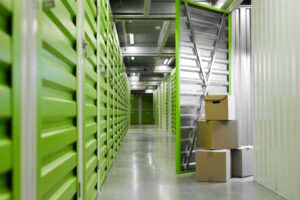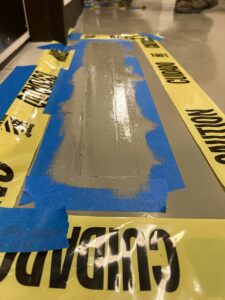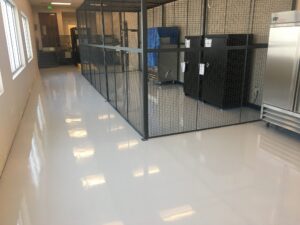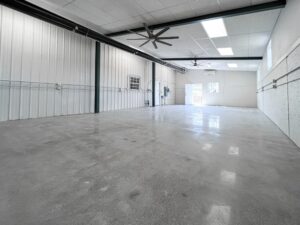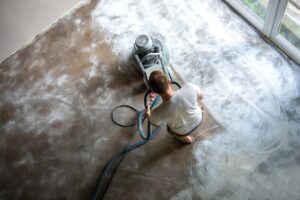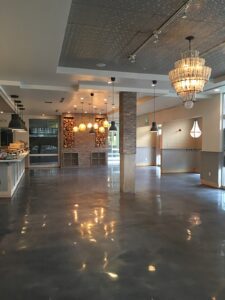BLOG
Designing any type of commercial property depends on making sure that you are considering the usage of the property in the long term. That is why many self-storage facilities need to consider concrete flooring. Self-storage facilities prioritize durability, low maintenance, and cost-effectiveness in their construction and design choices. Concrete flooring stands out as a particularly suitable option, offering a range of benefits tailored to the unique needs of these facilities. At Colorado Concrete Repair, we provide concrete flooring for storage facilities in the Denver area, with affordable and long lasting solutions that are ready to help your property. Why Choose Concrete Flooring Self-Storage Facilities? Concrete flooring is an excellent choice for a variety of commercial properties. But it especially stands out in the commercial space, as it offers: High Durability and Load-Bearing Capacity – Concrete floors are incredibly durable, capable of withstanding the heavy loads typical in storage units, such as furniture, appliances, and vehicles. This strength ensures the floor remains intact and functional under constant use and varying storage demands. Low Maintenance Requirements – One of the most significant […]
...READ MOREEpoxy flooring is renowned for its durability and longevity, making it a popular choice for commercial properties that are likely to experience foot traffic, chemicals, heavy machinery, and other abuse. However, like any material, it’s not immune to wear and tear over time. Early detection of potential issues is key to maintaining the integrity and appearance of your epoxy flooring, especially because epoxy can be very easy and cost effective to repair provided that you notice the issues and address them early. Identifying Early Signs of Epoxy Flooring Damage Later stage epoxy damage and decay is easy to notice, although by then, the cost to repair it could be more expensive and you run the risk of unattractive aesthetics or issues with the concrete below it. Early detection is far more useful. You can detect epoxy flooring damage early by looking for: Color Changes – One of the first signs of wear in epoxy flooring is discoloration. If you notice areas where the color seems to be fading or yellowing, it could indicate early damage or aging. Surface Marks and […]
...READ MOREIn the evolving world of commercial property design and renovation, micro toppings have emerged as a versatile and innovative flooring solution. This material is revolutionizing the way commercial spaces approach their floor aesthetics and functionality. But they can also be difficult to understand and not every property manager will be familiar with them here in Denver, so let’s discuss what this type of coating involves. Understanding Micro Toppings Micro toppings are a thin layer of polymer-modified concrete that can be applied over existing concrete surfaces. Typically no more than an eighth of an inch thick, this overlay is designed to be both lightweight and durable. It’s an ideal choice for rejuvenating old, worn-out concrete floors or for adding a decorative touch to new concrete installations. Some of the benefits of this type of flooring coating include: Aesthetic Versatility – Micro toppings are known for their wide range of colors and textures. They can be tinted, stained, or dyed to match any color scheme and can be textured to resemble tile, stone, wood, or other patterns. Durability – Despite their thinness, […]
...READ MOREAn architectural topping slab refer to a layer of high-quality concrete placed over another concrete surface, primarily for the purpose of enhancing its appearance and functionality. This method is often employed in situations where the existing concrete substrate may lack the desired finish or quality. The topping slab, usually several inches thick, is meticulously designed and installed to bring both durability and an aesthetic upgrade to the surface. In the realm of commercial and residential construction, architectural topping slabs are gaining traction as a functional and aesthetic solution for flooring. This innovative approach combines the structural strength of concrete with the versatility of various finishes, making it a popular choice in modern architecture. Key Characteristics and Benefits of Topping Slab Architectural topping slabs offer many benefits for commercial property owners and managers. Some of these benefits include: Versatility in Design – One of the most appealing aspects of architectural topping slabs is their design flexibility. They can be customized with colors, patterns, and textures, matching the specific design intent of a project. Durability and Longevity – Like traditional concrete, these […]
...READ MOREWhen considering flooring options for multi-story buildings, concrete flooring often comes up as a durable and stylish choice. However, a common question is whether concrete flooring can be practically and safely installed on upper levels, such as the second, third, or fourth floors. The answer is “yes,” but there are specific and important details to consider. The Viability of Concrete Flooring in Multi-Story Buildings Concrete, known for its strength and longevity, is a versatile material increasingly used in various types of construction, including upper-story installations. It is becoming so popular that many properties are switching from other materials, such as tile and laminate, to concrete that has been styled and decorated to look like other forms of flooring. Concrete flooring can be used on the upper floors of commercial properties very successfully. However, its ability to be installed on higher floors hinges on several factors: Structural Integrity – The building’s structure must be able to support the weight of concrete, which is heavier than other flooring materials. An assessment by a structural engineer is crucial to determine if the building […]
...READ MOREFlooring for Grocery Stores and Retail In the high-traffic, demanding environment of a grocery store, flooring is more than just a surface to walk on – it’s an integral component of safety, hygiene, and customer experience. While there are multiple flooring options available, such as vinyl or tile, concrete and epoxy flooring emerge as the most viable solutions. These options cater to the essential requirements of durability, easy maintenance, and aesthetic appeal, which are crucial for a grocery store setting. Colorado Concrete Repair is proficient in installing, repairing, and maintaining concrete and epoxy flooring for grocery stores in Denver and surrounding areas like Aurora, Commerce City, and Lakewood. Our proficiency in managing commercial spaces of varying sizes makes us the ideal choice for your flooring needs. Contact us to find out how we can enhance your grocery store. Where Concrete and Epoxy Flooring Fit in a Grocery Store A grocery store comprises various sections, each with its own set of flooring requirements: Entrance Areas – A space that must withstand the brunt of foot traffic, carts, and potential moisture. Aisles […]
...READ MORE
